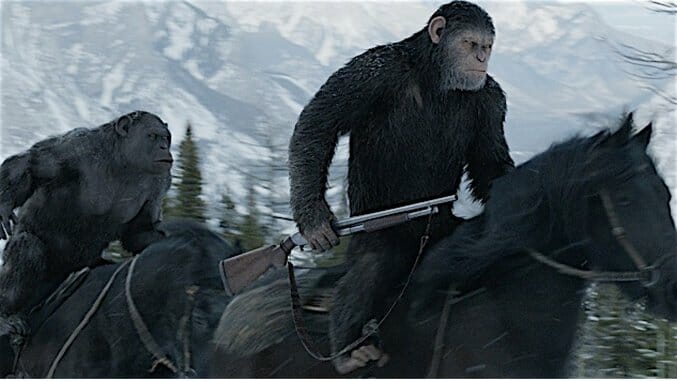War for the Planet of the Apes

Fox’s Planet of the Apes reboot has proven to be the best, smartest franchise since Christopher Nolan completed his Dark Knight trilogy in 2012. And like The Dark Knight Rises, War for the Planet of the Apes is a grand, ambitious final chapter that doesn’t entirely stick the landing. The disappointment isn’t overwhelming, though: This closing act maintains the series’ somber, thoughtful tone and its insistence on delivering widescreen spectacle with an emotional undercurrent. War can’t top 2014’s magnificent Dawn of the Planet of the Apes, instead extending and repeating some of its thematic thrust. If there’s any letdown, it’s only because this franchise has trained us to expect greatness, whereas this new sequel merely peaks at pretty good.
Taking place two years after the events of Dawn, War is even more ape-centric than the previous installment. On the run from a band of elite human soldiers, Caesar (Andy Serkis) leads his tribe deep into the forest, but soon they’re attacked by Colonel McCullough (Woody Harrelson), whose heavily armed forces wipe out a large swath of the apes, including Caesar’s beloved son. Vowing vengeance but also wanting to protect the others, Caesar sends the rest of the monkeys to a remote desert while he goes after McCullough. But Caesar’s closest allies, including Maurice (Karin Konoval) and Rocket (Terry Notary), refuse to let him go alone, accompanying him to find McCullough’s compound.
War shares the same creative team as Dawn—it’s directed by Matt Reeves and co-written by him and Mark Bomback. And there are surprises in store for Caesar and the audience, which shouldn’t be spoiled. But along the way, the apes stumble upon another talking chimp, known simply as Bad Ape (Steve Zahn), and a mute young girl named Nova (Amiah Miller), who seems to have been abandoned. Caesar reluctantly brings her along, which turns out to be a wise move since she becomes a clue to the future of the human race.
In ways both subtle and not, War aspires to the fever-dream majesty of Apocalypse Now, putting Caesar on a collision course down a metaphorical river with his own personal Kurtz. Bathed in moody low light and sporting a shaved head and ominous eyes, McCullough has the twitchy megalomania of Marlon Brando’s iconic character, except he isn’t quite as deranged. At least not yet. When Caesar and his troops arrive at the compound, they discover that their fellow apes have been captured and reduced to slaves, being forced to work hard labor to fortify the base’s defenses. Sadistic and vindictive, McCullough has his reasons for brutalizing Caesar’s kind, but Harrelson enjoys letting his portrayal walk a knife’s edge between disturbing and slightly hammy. The colonel may be going insane, but he plans on going in style.
Harrelson’s performance is one of the elements that keeps War from being as titanic as it could have been. Dawn also featured a showdown between Caesar and a driven human leader, although Gary Oldman was far more restrained in the role. That moderation fit with Dawn’s mournful tone—it was the first movie in the series to show the full impact of Rise of the Planet of the Apes’ devastating killer virus—and so the performances were understandably haunted and muted, as if all the characters were still shell-shocked by the tragedy.
War may share Dawn’s grim aura, but where Dawn was a typical second installment—darker and more despairing—the new film has the familiar feel of the last chapter in a trilogy: It swings for the fences, trying to end the franchise with a flourish. As such, McCullough has been conceived for maximum dramatic grandeur, but neither the writing nor Harrelson’s portrayal entirely justifies the buildup. Despite his furrowed-brow intensity and scene-chewing gusto, Harrelson can’t convey the same gravitas that Serkis effortlessly provides in a superb motion-capture performance as Caesar. For all of War’s insistence that this is the epic, final confrontation between ape and human, the emotional stakes are uneven because, as ruthless as McCullough seems, he never quite comes across as emblematic of humanity’s worst or most primal tendencies.
-

-

-

-

-

-

-

-

-

-

-

-

-

-

-

-

-

-

-

-

-

-

-

-

-

-

-

-

-

-

-

-

-

-

-

-

-

-

-

-








































